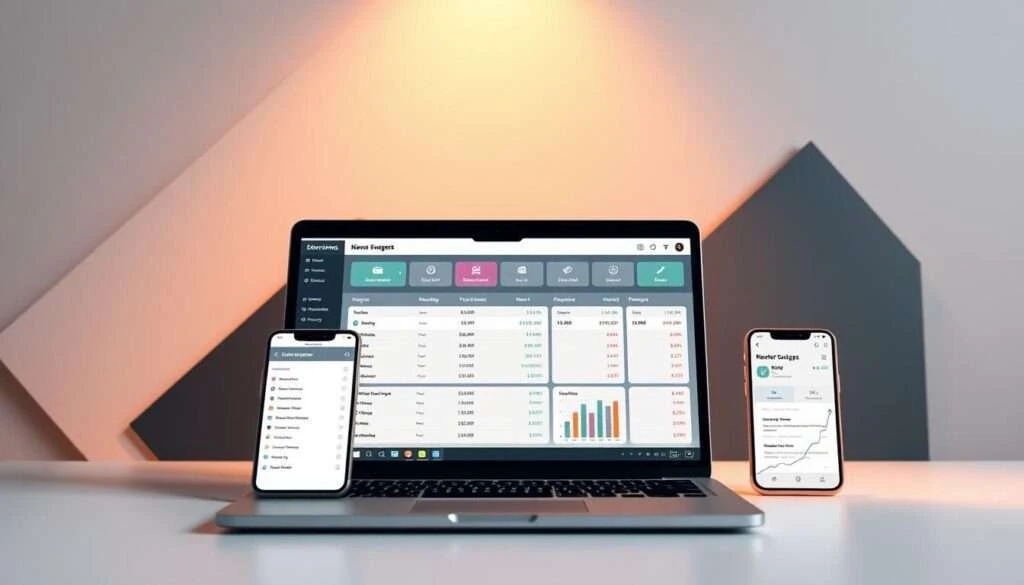Stay Financially Fit: Top Budgeting Tools to Try
Discover the top budget apps to help you stay financially fit. Master your money with our curated list of the best budgeting tools.

Managing your money well is key to financial stability. Budgeting tools help track spending, create budgets, and make smart money choices. They reduce stress, help reach financial goals, and boost overall financial health. Using these tools is crucial for managing your finances well.
Budgeting tools are vital for understanding spending habits and finding ways to improve. They offer real-time financial insights, helping you stay on top of your money. By using these tools, you can control your financial future and move closer to your goals.
Introduction to Budgeting
Budgeting is a key part of managing your finances. The right budgeting tools can make a big difference. With so many options, finding the best one for you can be tough. This article will look at the top budgeting tools, their features, and benefits to help you make the right choice for your finances.
Key Takeaways
- Budgeting tools are essential for managing personal finance effectively
- Using budgeting tools can help reduce financial stress and improve financial well-being
- Budgeting tools provide real-time financial insights and enable individuals to make informed financial decisions
- There are numerous budgeting tools available, and choosing the right one is crucial for individual financial needs
- Budgeting tools can help individuals achieve their financial goals and improve their overall financial stability
Why Digital Budgeting Tools Matter in Today’s Economy
Today’s fast-paced economy makes financial planning and money management key. Digital technology has brought new tools to replace old methods. These tools are easy to use, automate tasks, and give real-time financial insights.
More people now see the value in managing their finances well. They look for tools that make it easier. Digital budgeting tools give a clear view of your finances, helping with planning and management. Financial planning has never been simpler, thanks to these tools.
Some main benefits of digital budgeting tools include:
- Automated expense tracking
- Real-time financial insights
- Personalized budgeting recommendations
- Secure data storage
Using digital budgeting tools lets you control your financial future. They help with saving for big purchases or managing your finances. Their ease and features make them vital for today’s financial planning and money management.
Understanding Your Budgeting Style and Needs
Managing your finances well starts with knowing your budgeting style and needs. This means tracking your expense tracking habits and finding ways to get better. By doing this, you can make smart choices about your financial goals and pick the best tools to reach them.
There are many budgeting styles out there, each with its own way of doing things. Some like the 50/30/20 rule, while others prefer zero-based budgeting or envelope budgeting. To find the best one for you, think about your financial goals and expense tracking habits. See what works for you and what doesn’t, and be open to changing your approach if needed.
Knowing your budgeting style and needs is key to financial success. It means being careful with your expense tracking and making thoughtful choices about how you spend your money. With the right strategy and tools, you can manage your finances well and reach your long-term goals.
Top Budget Apps for Every Financial Goal
Managing your money well is key to financial stability. With so many financial apps out there, picking the right one can be tough. These apps have different features, like budgeting, tracking expenses, and saving tools. Think about what you need based on your financial goals.
Some apps help with saving for big things like a house or paying off debt. They offer custom plans, tracking, and reminders to keep you on track. Other apps focus on investing and managing wealth, with tools for tracking your portfolio and getting investment advice.
When looking at financial apps, consider how easy they are to use, how secure they are, and how good their customer support is. Choose apps with simple interfaces, strong security, and helpful customer support. Some apps also have educational tools and financial planning resources to help you make smart choices.
- Free budgeting apps: offer basic features like expense tracking and budgeting
- Premium apps: provide advanced features like investment tracking and financial planning
- Cross-platform solutions: allow users to access their financial data across multiple devices
Choosing the right financial app can make managing your money easier. It helps you reach your financial goals and feel more secure. With so many options, it’s important to compare features, prices, and what other users say to find the best app for you.
Essential Features to Look for in Budgeting Tools
When picking a budgeting tool, look for features that help manage your money well. Effective budgeting software should track your budget, categorize expenses, and set financial goals. These features let you watch your spending, find ways to save, and reach your money goals.
A top budgeting tool also tracks investments and sends reminders for bills. This keeps your investments in check and makes sure you pay on time. 
Some key features to look for in budgeting software include:
- Automated expense tracking
- Customizable budget categories
- Financial goal setting and tracking
- Investment tracking and analysis
- Bill reminders and payment scheduling
By looking for these features, you can find a budgeting tool that fits your needs. Make sure to check the tool’s user experience, security, and customer support before choosing.
Desktop vs. Mobile Budgeting Solutions
Managing finances can be done through desktop or mobile solutions. Each has its own benefits and drawbacks. The choice depends on what you prefer and your financial needs. Mobile apps make it easy to track expenses anywhere, thanks to mobile finance.
On the other hand, web-based tools are accessible from any device with internet. This lets you manage your money from anywhere. It’s important to weigh the pros and cons of each option. Consider these key points:
- Accessibility: Can you use your budgeting tool from any device, or is it only for one platform?
- Mobility: Do you need to track your finances anywhere, or can you do it from one place?
- Integration: Can your tool connect with your bank and investment accounts for a full financial view?
Thinking about these points helps you pick the right budgeting tool. Whether it’s a web tool or a mobile finance app, choose what fits your life and financial needs.
Security Considerations for Financial Apps
Managing your finances online is a big deal. Financial security is key. With digital budgeting tools on the rise, it’s crucial to check the security of these apps.
Look for apps that encrypt your data and store it safely. Also, use two-factor authentication and strong passwords to protect your accounts.
Be on the lookout for data breaches, phishing, and malware. Keep your software updated and be careful with links and personal info online.
By being cautious and choosing a secure app, you can use digital budgeting safely. This way, you keep your financial security intact.
Comparing Popular Budgeting Tools: Pros and Cons
Finding the right budgeting tool is key for managing your money. With so many choices, it’s important to compare them well. We’ll look at the main points of popular tools, like how easy they are to use, their cost, and customer support.
A good user interface can greatly improve your experience. Some apps are easy to use and track your spending. Others might be harder to get used to. A budgeting apps comparison can show you which ones are easier to use.
It’s also crucial to think about the cost and what you get for it. Some apps are free, while others cost money. A detailed budgeting apps comparison can help you find the best deal. Look at these things:
- User interface and experience
- Price points and value
- Customer support quality
By looking at these points and doing a deep budgeting apps comparison, you can find the best tool for your money management needs.
Getting Started with Your Chosen Budget Tool
Setting up budgeting tools is easy if you know how. First, pick a budget tool that fits your needs. Then, set it up right to use all its features. Start by linking your bank accounts and setting goals, like saving for emergencies or paying off debt.
When setting up budgeting tools, think about automating your savings and investments. This means setting up automatic transfers from your checking to savings or investments. Also, use features like bill tracking and reminders to keep track of your spending.

- Link your bank accounts and credit cards to track your expenses
- Set financial goals, such as saving for a specific purpose or paying off debt
- Automate your savings and investments to make the most out of your budget
By following these steps andsetting up budgeting toolscorrectly, you can take control of your finances. You’ll be on your way to reaching your financial goals.
Conclusion: Taking Control of Your Financial Future with the Right Tools
Throughout this article, we’ve shown that the right budgeting tools are key to controlling your financial future. Whether you want to pay off debt, save for a down payment, or better understand your monthly spending, today’s digital tools offer great help.
Using financial planning and budgeting apps can help you develop good financial habits. You can set realistic goals and make smart choices for a more secure financial future. Remember, getting financially free is a slow but steady process. With the right tools, you’re on the right path.
If you’re new to budgeting or already a pro, we suggest checking out the tools we discussed. Find the one that suits your needs and goals. With the right financial future planning tools, you’ll be ready to take charge and achieve your financial dreams.
FAQ
What are the key benefits of using digital budgeting tools?
Digital budgeting tools make managing money easy and automatic. They give you real-time financial updates. This helps you see your financial situation clearly.
These tools help you control your money better. They aid in reaching financial goals and making smart choices.
How can I determine the best budgeting style for my needs?
First, figure out your financial goals and what you spend. There are many budgeting styles like the 50/30/20 rule and zero-based budgeting.
Choosing the right style helps you pick the best tool. It should match your financial habits and goals.
What are the essential features to look for in a budgeting tool?
Look for budget tracking, expense categorization, and goal setting. Also, check if it tracks investments and sends bill reminders.
Consider the user experience, security, and customer support too. These factors are key to a good budgeting tool.
How do I ensure the security of my financial information when using budgeting apps?
Use strong passwords and two-factor authentication. Keep your software updated.
Choose apps that use encryption and secure data storage. This keeps your financial info safe.
How can I maximize the features of my chosen budgeting tool?
Start by linking your bank accounts and setting goals. Learn how to use the tool’s features, like automating savings.
Be ready to solve any setup or usage problems. This will help you use the tool to its fullest.








Leave a comment